|
Flupdo
v1.2
|
|
Flupdo
v1.2
|
Query builder base class, which provides some magic to build queries. More...
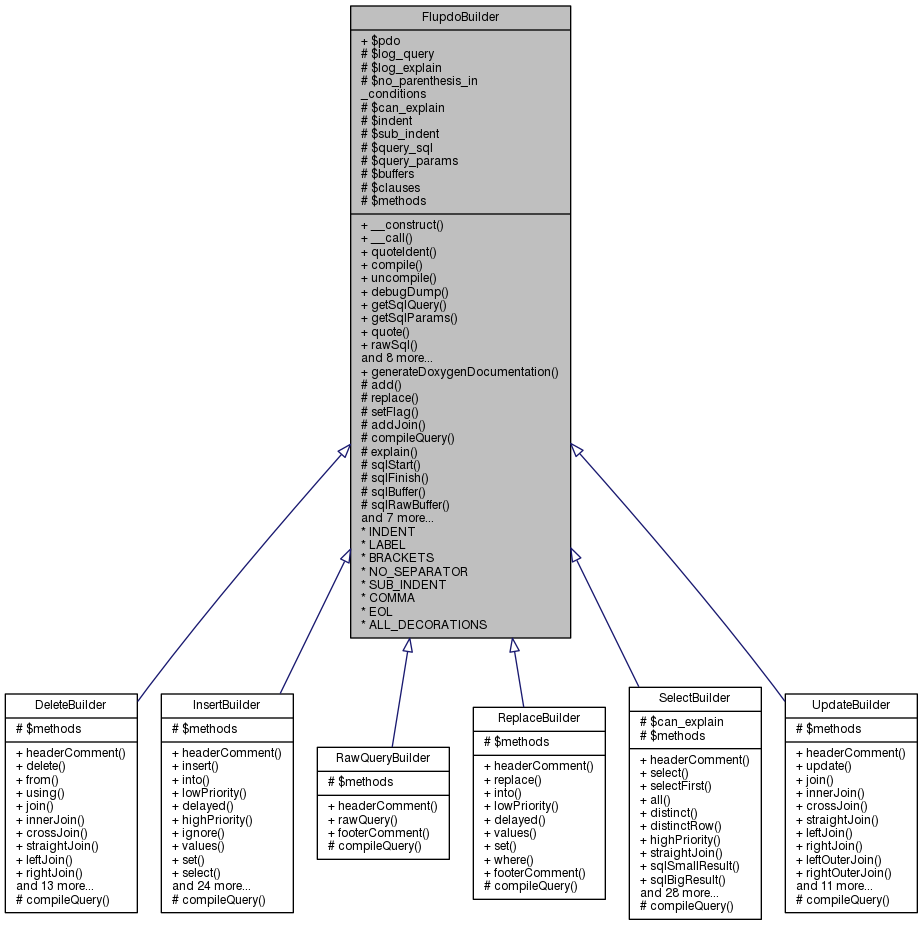
Public Member Functions | |
| __construct ($pdo, $log_query=false, $log_explain=false, $no_parenthesis_in_conditions=false) | |
| Constructor. | |
| __call ($method, $args) | |
| Call buffer-specific method to process arguments. More... | |
| quoteIdent ($ident) | |
Quote identifier, preserve dot. | |
| compile () | |
| Call compile function in a safe way. | |
| uncompile () | |
| "Uncompile" the query. More... | |
| debugDump () | |
| Fluently dump query to error log. | |
| getSqlQuery () | |
| Get compiled SQL query, use only for debugging. | |
| getSqlParams () | |
| Get parameters for compiled SQL query, use only for debugging. | |
| quote ($value) | |
| Quotes a string for use in a query. More... | |
| rawSql ($sql) | |
| Returns object marking raw SQL statement. | |
| exec () | |
| Builds and executes an SQL statement, returning the number of affected rows. More... | |
| query () | |
| Builds, binds and executes an SQL statement, returning a result set as a PDOStatement object. More... | |
| prepare ($driver_options=array()) | |
| Builds and prepares a statement for execution, returns a statement object. More... | |
| lastInsertId () | |
| Proxy to PDO::lastInsertId(). | |
| fetchSingleRow () | |
| Fetch one row from result and close cursor. More... | |
| fetchSingleValue () | |
| Fetch one row from result and close cursor. More... | |
| fetchAll ($key_column=null) | |
| Fetch everything into array. More... | |
| __toString () | |
| Get SQL query as a string. | |
Static Public Member Functions | |
| static | generateDoxygenDocumentation () |
| Generate documentation for methods defined in $methods array. | |
Public Attributes | |
| $pdo | |
| PDO driver used to execute query and escape strings. | |
Protected Member Functions | |
| add ($args, $buffer_id) | |
| Add SQL fragment to buffer. | |
| replace ($args, $buffer_id) | |
| Replace buffer content with SQL fragment. | |
| setFlag ($args, $buffer_id, $label) | |
| Set flag. More... | |
| addJoin ($args, $buffer_id, $label) | |
| Add join statement to buffer. | |
| compileQuery () | |
| Process all buffers and build SQL query. More... | |
| explain () | |
| Explain the query and dump result to log. | |
| sqlStart () | |
| Start SQL generating. More... | |
| sqlFinish () | |
| Finish SQL generating. More... | |
| sqlBuffer ($buf) | |
| Add SQL with parameters. More... | |
| sqlRawBuffer ($buf) | |
| Generate raw SQL fragment. | |
| sqlComment ($buffer_id) | |
| Generate SQL comment. | |
| sqlFlag ($buffer_id) | |
| Generate flag fragment. | |
| sqlStatementFlags ($buffer_id, $flag_buffer_ids, $decorations) | |
| Generate SQL fragment made of flags. | |
| sqlList ($buffer_id, $decorations) | |
| Generate SQL fragment made of list. | |
| sqlValuesList ($buffer_id) | |
| Generate SQL fragment made of list values. More... | |
| sqlJoins ($buffer_id) | |
| Generate SQL fragment made of joins. | |
| sqlConditions ($buffer_id) | |
| Generate SQL fragment made of conditions in AND statement. | |
Protected Attributes | |
| $log_query | |
| Log all queries as they are executed. | |
| $log_explain | |
| Explain each query to log. | |
| $no_parenthesis_in_conditions | |
| Sphinx does not like parenthesis in WHERE. | |
| $can_explain = false | |
| Is it possible to explain this query? | |
| $indent = "\t" | |
| Indentation string. | |
| $sub_indent = "\t::t" | |
| Second level indentation string. | |
| $query_sql = null | |
| Built query. | |
| $query_params = null | |
| Parameters for prepared statement (to be bound before query is executed). | |
| $buffers = array() | |
| Buffers containing SQL fragments. | |
Static Protected Attributes | |
| static | $clauses = array() |
| List of clauses used to composed result query. More... | |
| static | $methods = array() |
| List of methods used to fill the $buffers. More... | |
Flags for helper methods. | |
Used by sqlList() and sqlStatementFlags(). | |
| const | INDENT = 0x01 |
| List items should be indented. | |
| const | LABEL = 0x02 |
| SQL fragment has a label. | |
| const | BRACKETS = 0x04 |
| There are brackets around each item in the list. | |
| const | NO_SEPARATOR = 0x08 |
| No separator between list items. | |
| const | SUB_INDENT = 0x20 |
| Indent more the first line. | |
| const | COMMA = 0x40 |
| Add comma after the SQL fragment. | |
| const | EOL = 0x80 |
| Add EOL after the SQL fragment. | |
| const | ALL_DECORATIONS = 0xFF |
| Make it fancy! | |
Query builder base class, which provides some magic to build queries.
| __call | ( | $method, | |
| $args | |||
| ) |
Call buffer-specific method to process arguments.
If the first argument is null, corresponding buffer will be deleted.
|
protected |
Set flag.
Replace buffer with new label of this flag.
|
abstractprotected |
Process all buffers and build SQL query.
Side product is array of parameters (stored in $this->args) to bind with query.
This function is called by FlupdoBuilder, do not call it directly.
Example:
$this->sqlStart(); // ... return $this->sqlFinish();
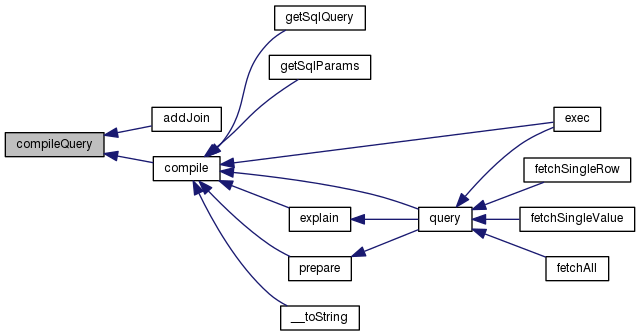
| uncompile | ( | ) |
"Uncompile" the query.
This will drop compiled query and allow additional modifications. Once query is compiled additional modifications are not allowed to detect programming errors, but sometimes it is useful to execute the query and then perform additional modifications before second execution.
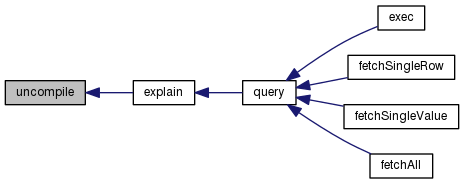
| quote | ( | $value | ) |
Quotes a string for use in a query.
Proxy to PDO::quote().
| exec | ( | ) |
Builds and executes an SQL statement, returning the number of affected rows.
Proxy to PDO::exec().

| query | ( | ) |
Builds, binds and executes an SQL statement, returning a result set as a PDOStatement object.
Proxy to PDOStatement::prepare() & PDOStatement::bindValue() & PDOStatement::query(). But if there is nothing to bind, PDO::query() is called instead.

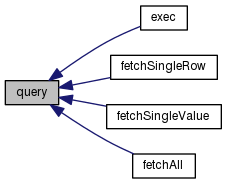
| prepare | ( | $driver_options = array() | ) |
Builds and prepares a statement for execution, returns a statement object.
Proxy to PDO::prepare().

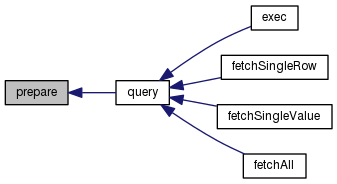
| fetchSingleRow | ( | ) |
Fetch one row from result and close cursor.
Returns what PDOStatement::fetch() would return.

| fetchSingleValue | ( | ) |
Fetch one row from result and close cursor.
Returns what PDOStatement::fetchColumn(0) would return.

| fetchAll | ( | $key_column = null | ) |
Fetch everything into array.
Returns what PDOStatement::fetchAll(PDO::FETCH_ASSOC) would return.
If $key_column is set, the specified column will be used to index array items.

|
protected |
Start SQL generating.
Uses output buffering to concatenate the query.
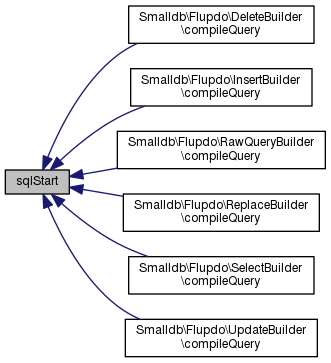
|
protected |
Finish SQL generating.
Picks up the query from output buffer.
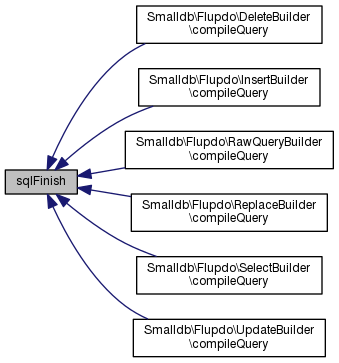
|
protected |
Add SQL with parameters.
Parameters are stored in groups, merge to one array is done at the end (using single array_merge call).
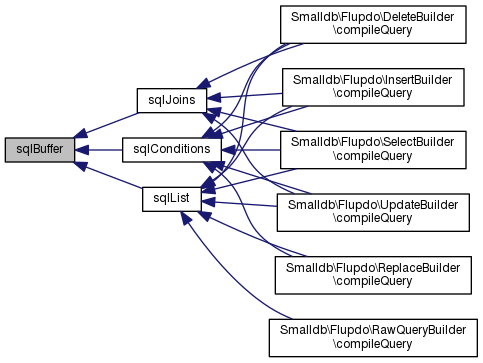
|
protected |
Generate SQL fragment made of list values.

|
staticprotected |
List of clauses used to composed result query.
Shared constant data.
|
staticprotected |
List of methods used to fill the $buffers.
Shared constant data.
 1.8.11
1.8.11